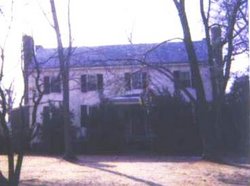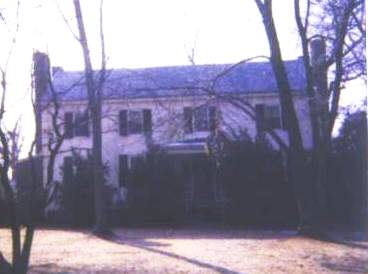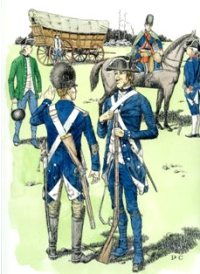In 1775 young Captain Charles Dabney marched from Hanover County Virginia with Patrick Henry's gallant band that exhorted from Lord Dunmore the surrender of public powder, which had been removed from the Williamsburg magazine. Immediately after Lexington, he organized a company of Hanover District minutemen and commencing with the start of the Revolutionary War, the acclaimed soldier quickly rose to major in the 3rd VA State Line Regiment. Major Dabney fought battles at Germantown and Princeton in 1777 and served under General "Mad Anthony" Wayne at Stony Point. During that engagement, his legion stormed a well garrisoned fortress in a brilliant and bloody bayonet attack. He was appointed lieutenant colonel of his own eponymous "Dabney's Legion", so named because it had more men than a company and not enough for a regiment. It also contained a number of Dabney kinsmen, including his older brother, George and first cousin, James, both captains in the legion. By 1778 his legion joined the Continental Army with the 2nd VA State Line Regiment, just in time to spend the winter at Valley Forge. At that same location the epic Battle of Monmouth took place on a day so hot that many soldiers died from heat exhaustion. A monument there marks the position of Colonel Dabney's campsite under the command of Major General Nathaniel Greene.
The Calendar of Virginia State Papers holds letters from Dabney to Governor Benjamin Harrison and Colonel William Davies (Military Asst. to Gov. Harrison) throughout the war. Writing Davies in August 1781 he asks for clothing for his troops, "who are almost naked", and is anxious to procure enough arms to drill. Serving under Lafayette during the 1781 Yorktown campaign against Cornwallis, Colonel Dabney held the confidence of the Marquis, as illustrated in his note, "The wounded moved…surgeons must be sent… and wagons made ready. I request you pay particular attention to this matter…everything in readiness to move at the shortest warning… We must guard against possibilities and by fighting them in detail defeat their future projects. I have the honor to be your most obedient humble servant, Lafayette".
After the surrender, the Articles of Capitulation of Cornwallis, listing men, guns and accoutrements, were given to Colonel Dabney at a dinner with George Washington, where the general instructed him with regard to his duties at the Oct. 19, 1781 capitulation. In Jan. 1782 a board of state officers consolidated remnants of all state line units into Charles Dabney's Virginia State Legion. The reformed legion numbered about 225 officers and men who garrisoned at Richmond, Hampton and Yorktown for almost two years after the surrender. In Sept. 1782, Dabney put down a small mutiny, probably brandishing his trademark large bore rifle that was inscribed with his name. The legion was disbanded in Apr. 1783 and Colonel Charles Dabney received the thanks of Congress for distinguished service, becoming a charter member of The Society of the Cincinnati, his membership certificate signed by General George Washington.
After the Revolution, with the purpose of locating lands to which he was entitled as compensation for military service, Charles Dabney set out in 1783 to the Kentucky wilderness. Perceiving the slim likelihood of holding the lands as a non-resident, he sold the largest portion in the West at a very low price. Little concern was given to the sacrifice, as he was in easy circumstances and had means of indulging his perennial stream of natural benevolence. Never married, unambitious and possessing a fortune, he was known to be generous to relatives and charitable to poor neighbors. Upwards of six feet tall, athletic and well proportioned, Charles retained the dignified carriage and slow measured gait of a soldier and as a passionate hunter kept fit. Each Sabbath, for as long as physically able, he rode to "The Grove" plantation to visit his brother George, with whom he shared a lifelong friendship. By late in the colonial period, he was already a prominent Hanover County planter, operated a grain mill and copartner in a blacksmith shop.
Frequently consulted for his opinions which indicated sound judgment and practical sense, Colonel Dabney possessed a knack for putting everyone at their ease while giving council freely and kindly. Dignified in his conduct, unceremoniously polite, his conversation was reportedly full of maxims. In 1800 Charles ran on the American Republican Ticket from his district composed of Hanover, Caroline and Louisa Counties and suffered defeat in part due to refusal to engage in the intrigues popular at the time. His reputation as an esteemed "Elder Statesman" held in great respect by his friends in public life is evident from letters of some of the great men of his times.
William Wirt, Attorney General to President James Monroe, corresponded with the colonel in October 1819 regarding Andrew Jackson's campaign against the Spanish Colonies in Florida. Wirt suggested that Dabney come visit and sit in on the congressional debate on the subject, "come straight to my house where you will find a bed ready for you…I wish I could suggest some motive to bring you on – for I am sure it would contribute to your amusement as well as to our happiness…love to you and yours- In life and death your friend, Wm. Wirt."
Along with his old military comrades, several years were spent pressing upon the Virginia legislature the justice of the claims of the soldiers of the Revolution. Colonel Dabney wrote Chief Justice John Marshall in 1826 requesting assistance in acquiring certificates to obtain pensions and land grants for veterans. An ardent Federalist and Marshall's friend since his congressional days, the certificates were sent to Charles along with the letter closing, "I am gratified to hear that your health is so perfectly…and that you still enjoy life. That you may long enjoy it is the wish of him who is with great esteem and regard your…J. Marshall."
When long admired ally Lafayette returned to America in 1824, he sent Colonel Dabney "affectionate regards" after he learned that Charles was too feeble to meet him in Richmond. Found among his papers after his death at age 84, were three letters about personal business from Patrick Henry, childhood friend, close compatriot and distant cousin. The colonel is believed to be buried in a corner of the garden at his Hanover County plantation of "Aldingham", although time has concealed any stone marking the grave. The estate was left to his nephew, aptly named Charles Dabney, who resided with him for many years and assisted in the management of the estate, and entailing this property on his son, Charles William Dabney, who became a captain in the CSA and attorney.
In 1775 young Captain Charles Dabney marched from Hanover County Virginia with Patrick Henry's gallant band that exhorted from Lord Dunmore the surrender of public powder, which had been removed from the Williamsburg magazine. Immediately after Lexington, he organized a company of Hanover District minutemen and commencing with the start of the Revolutionary War, the acclaimed soldier quickly rose to major in the 3rd VA State Line Regiment. Major Dabney fought battles at Germantown and Princeton in 1777 and served under General "Mad Anthony" Wayne at Stony Point. During that engagement, his legion stormed a well garrisoned fortress in a brilliant and bloody bayonet attack. He was appointed lieutenant colonel of his own eponymous "Dabney's Legion", so named because it had more men than a company and not enough for a regiment. It also contained a number of Dabney kinsmen, including his older brother, George and first cousin, James, both captains in the legion. By 1778 his legion joined the Continental Army with the 2nd VA State Line Regiment, just in time to spend the winter at Valley Forge. At that same location the epic Battle of Monmouth took place on a day so hot that many soldiers died from heat exhaustion. A monument there marks the position of Colonel Dabney's campsite under the command of Major General Nathaniel Greene.
The Calendar of Virginia State Papers holds letters from Dabney to Governor Benjamin Harrison and Colonel William Davies (Military Asst. to Gov. Harrison) throughout the war. Writing Davies in August 1781 he asks for clothing for his troops, "who are almost naked", and is anxious to procure enough arms to drill. Serving under Lafayette during the 1781 Yorktown campaign against Cornwallis, Colonel Dabney held the confidence of the Marquis, as illustrated in his note, "The wounded moved…surgeons must be sent… and wagons made ready. I request you pay particular attention to this matter…everything in readiness to move at the shortest warning… We must guard against possibilities and by fighting them in detail defeat their future projects. I have the honor to be your most obedient humble servant, Lafayette".
After the surrender, the Articles of Capitulation of Cornwallis, listing men, guns and accoutrements, were given to Colonel Dabney at a dinner with George Washington, where the general instructed him with regard to his duties at the Oct. 19, 1781 capitulation. In Jan. 1782 a board of state officers consolidated remnants of all state line units into Charles Dabney's Virginia State Legion. The reformed legion numbered about 225 officers and men who garrisoned at Richmond, Hampton and Yorktown for almost two years after the surrender. In Sept. 1782, Dabney put down a small mutiny, probably brandishing his trademark large bore rifle that was inscribed with his name. The legion was disbanded in Apr. 1783 and Colonel Charles Dabney received the thanks of Congress for distinguished service, becoming a charter member of The Society of the Cincinnati, his membership certificate signed by General George Washington.
After the Revolution, with the purpose of locating lands to which he was entitled as compensation for military service, Charles Dabney set out in 1783 to the Kentucky wilderness. Perceiving the slim likelihood of holding the lands as a non-resident, he sold the largest portion in the West at a very low price. Little concern was given to the sacrifice, as he was in easy circumstances and had means of indulging his perennial stream of natural benevolence. Never married, unambitious and possessing a fortune, he was known to be generous to relatives and charitable to poor neighbors. Upwards of six feet tall, athletic and well proportioned, Charles retained the dignified carriage and slow measured gait of a soldier and as a passionate hunter kept fit. Each Sabbath, for as long as physically able, he rode to "The Grove" plantation to visit his brother George, with whom he shared a lifelong friendship. By late in the colonial period, he was already a prominent Hanover County planter, operated a grain mill and copartner in a blacksmith shop.
Frequently consulted for his opinions which indicated sound judgment and practical sense, Colonel Dabney possessed a knack for putting everyone at their ease while giving council freely and kindly. Dignified in his conduct, unceremoniously polite, his conversation was reportedly full of maxims. In 1800 Charles ran on the American Republican Ticket from his district composed of Hanover, Caroline and Louisa Counties and suffered defeat in part due to refusal to engage in the intrigues popular at the time. His reputation as an esteemed "Elder Statesman" held in great respect by his friends in public life is evident from letters of some of the great men of his times.
William Wirt, Attorney General to President James Monroe, corresponded with the colonel in October 1819 regarding Andrew Jackson's campaign against the Spanish Colonies in Florida. Wirt suggested that Dabney come visit and sit in on the congressional debate on the subject, "come straight to my house where you will find a bed ready for you…I wish I could suggest some motive to bring you on – for I am sure it would contribute to your amusement as well as to our happiness…love to you and yours- In life and death your friend, Wm. Wirt."
Along with his old military comrades, several years were spent pressing upon the Virginia legislature the justice of the claims of the soldiers of the Revolution. Colonel Dabney wrote Chief Justice John Marshall in 1826 requesting assistance in acquiring certificates to obtain pensions and land grants for veterans. An ardent Federalist and Marshall's friend since his congressional days, the certificates were sent to Charles along with the letter closing, "I am gratified to hear that your health is so perfectly…and that you still enjoy life. That you may long enjoy it is the wish of him who is with great esteem and regard your…J. Marshall."
When long admired ally Lafayette returned to America in 1824, he sent Colonel Dabney "affectionate regards" after he learned that Charles was too feeble to meet him in Richmond. Found among his papers after his death at age 84, were three letters about personal business from Patrick Henry, childhood friend, close compatriot and distant cousin. The colonel is believed to be buried in a corner of the garden at his Hanover County plantation of "Aldingham", although time has concealed any stone marking the grave. The estate was left to his nephew, aptly named Charles Dabney, who resided with him for many years and assisted in the management of the estate, and entailing this property on his son, Charles William Dabney, who became a captain in the CSA and attorney.
Family Members
Advertisement
Explore more
Sponsored by Ancestry
Advertisement






